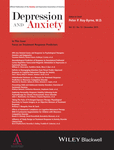DEFICITS IN DISENGAGING ATTENTION FROM THREAT PREDICT IMPROVED RESPONSE TO COGNITIVE BEHAVIORAL THERAPY FOR ANXIETY
Contract grant sponsor: Research Foundation Flanders (FWO); Contract grant numbers: G.0339.08 and V407314N; Contract grant sponsor: University of Leuven, Centre of Excellence on Generalization Research (GRIP*TT); Contract grant number: PF/10/005.
Abstract
Background
Pretreatment biases in attending toward threat have been shown to predict greater symptom reduction following cognitive behavioral therapy (CBT) for anxiety. Findings to date do not extend to clinical severity of diagnoses and they assess treatment response immediately posttreatment and not at follow-up. Research in this area has also not examined components of vigilance (e.g., engagement, disengagement) or whether these effects are confined to external attention and not attention to internal symptoms of anxiety.
Methods
In the present investigation, 96 adults with a range of anxiety disorders completed a dot probe task to assess threat-related attention biases before and after 12 sessions of CBT.
Results
Pretreatment deficits in disengaging attention from external and internal threats, and not the speed of engagement with threat, predicted reductions in clinical severity of diagnoses that were maintained 2 years later. The presence of posttreatment attention biases was not associated with increased clinical severity after treatment.
Conclusions
Pretreatment deficits in disengaging attention from threat may promote better and more durable response to CBT for a range anxiety disorders.




